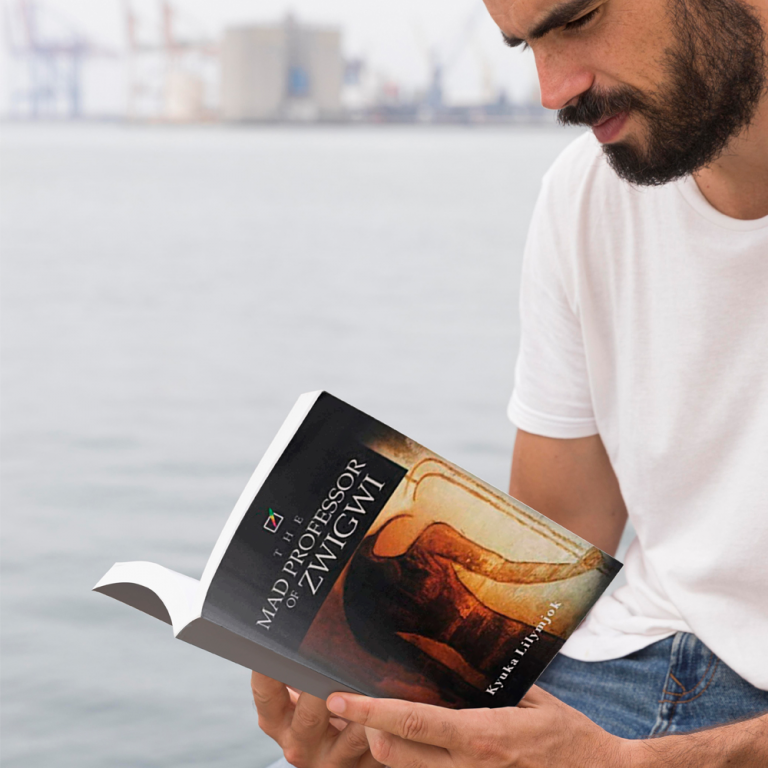Ogba, Victoria Onyapa
ogbavicks@gmail.com
Abstract
This chapter looks at the central themes, style and technique of Kyuka Lilymjok in his Farewell to Peace, noting the central theme of continued underdevelopment of third-world countries due to an international economic order that operates by the rule that might is right. A careful examination of the text as done in this chapter shows that the current world economic order is a neo-colonial strategy through which the developing nations are oppressed and exploited.
Introduction
Independence for several African countries around the 1960s brought hopes of rapid socio-economic development. Alas, this was not to be. Socio-economic development continued to be a mirage for many African countries to this day. Several theorists have sought to understand the phenomenon. Theorists of post-colonial Africa, such as Walter Rodney, Samir Amin and others came up with the concept of neo-colonialism, which Kwame Nkrumah called ‘the last stage of imperialism’ (web). According to Rodney and Amin, European countries and increasingly the United States, dominated the economies of African countries through neo-colonialism (web), which is evident in the unequal economic relationship that exist between African and the Western countries. African writers also continue to weigh in on the neo-imperialist debate with creative imaginative works reflecting diverse perspectives on the subject matter. Writers like Ngugi wa Thiong’o in his novels such as Petals of Blood or Wizard of the Crow, Helon Habila in his Oil on Water, Tanure Ojaide with his The Activist, May Ifeoma Nwoye in her The Oil Cemetery, Su’eddie Vershima Agema in his short stories collected in The Bottom of Another Tale,are prominent examples of African writers who write on the various aspects of neo-colonial activities prevailing in African life and society. This chapter looks at how Kyuka Lilymjok in Farewell to Peace joins the post-colonial debate on the woes afflicting African countries.
Summary of Farewell to Peace
Farewell to Peace by Kyuka Lilymjok can be classified under the genre of novella because of its limited contents and the symbolic settings and characters pervading the piece. Particularly in the early part of the novella, Kyuka Lilymjok adopts an expository style of writing that explains the themes of the novella which are not themes of common knowledge. The story opens on Sekia Mountains with two characters, Belaru and Dakas seen making their way through the treacherous rocky path of the forest towards the mountains which is about five kilometres away. Belaru is the leader of a terrorist group while Dakas is his latest recruit. Belaru is the central character around whom the story is woven. He is the leader of the Tendu Purgers, a terrorist group he forms after he is sacked from his teaching job at the University for teaching his students how certain economic theories and practices work to exploit or pauperize some nations and enrich others. Belaru has developed his radical stance following the loss of his parents at an early age which he blames on free trade. In a conversational expository style, Belaru lays out the master servant relationship that dominates relations between countries in the contemporary world set up. The next sections unfold the relationship Belaru talks about.
A World of Unequal Partners in Farewell to Peace
Belaru is the founder and leader of the terrorist group called Tendu Purgers. In the novella, he is the recruiter and ideologue that voices out the mission of the group. When the story opens, he is on a recruiting mission and his new recruit is Dakas on whom he has an uncanny pull. On their way to Sekia Mountains, Belaru tells Dakas how free trade killed his parents.
Belaru becomes an orphan at the age of seven and starts struggling to fend for himself at a very tender age. He blames free trade for his parents’ death because the company in which his father was working loses patronage as a result of free trade and starts running down, and therefore cannot afford to keep its workers. His father was laid off, becomes hypertensive and dies. His mother becomes heartbroken and dies soon thereafter. Belaru feels that the world economic order is unfair and unjust because it is the means through which the developed countries oppress developing nations and exploit their wealth. It is unjust because the rich get richer and the poor poorer because of oppression and exploitation. With his fully armed Tendu Purgers, he launches a revolutionary war against the international economic order. For Belaru and his group, it is farewell to peace for the world, if developed countries insist on such wicked and oppressive order, hence the title of the novella. These and many such economic practices as free trade, foreign aid and foreign investment form the central ideology Belaru espouses to his friends and recruits. For example, he tells Galla his friend in the university the implication of the above economic practices on developing nations:
We as a nation are this poor not necessarily because we have been less frugal or industrious, but because the international metropolitan centre has taken wealth from us and given us poverty through free trade, foreign investment and usurious lending. (6)
Free trade is the practice of removing restrictions on imports and exports of goods and services between countries (web). Such restrictions can include bans, quotas, and taxes among other measures. It is an attempt to increase the free flow of goods and services around the world without any barriers of high tariffs. The driving spirit behind this legislation is that the developed nations will easily sell their goods and services around the world without any hindrances.
Lilymjok portrays the free trade phenomenon as an attempt by developed nations in the neo-colonial age to dominate, control and exploit the economies of the developing countries. Through this system, they become richer while the developing nations become poorer. This is further illustrated in the lines below:
When you buy something from someone, money leaves you and goes to the seller; you become poorer, he becomes richer. By killing our industries, our people are thrown out of jobs and therefore are made poorer. By buying their goods, their people are kept in their jobs and are richer for this. (7)
The above quoted lines bring to the fore the exploitative tendencies of free trade and its job-killing consequences. It destroys the economies of developing nations by running down their companies and making their people jobless, to the advantage of the developed nations. Free trade favours the economies of the developed nations because it increases the sale of their products all over the world, thereby enhancing the growth of their companies and keeping their people in their jobs. The writer describes the system as ‘unfair’, ‘so selfish’ ‘cruel’ and ‘evil’. Free trade is however not the only method that is used to exploit the wealth of developing countries in the contemporary neo-colonial age. Other means include foreign aid and foreign investment.
Foreign aid refers to funds that are made available to struggling nations by countries that have the necessary financial strength to aid other countries in times of need. Foreign aid is supposed to help a country in need by making money or some material available to such country. The ordinary man may think that foreign aid is free assistance to aid or relieve a country of her burden in times of financial lack. But from what Lilymjok tells his readers, foreign aid is loaned money with heavy interest. In fact, he calls it ‘usurious lending’. Usury is the charging of high interest over loaned money. Belaru explains this to his friend Galla in the following lines:
You think what you often hear being given to you as aid is free money?…It is loaned money…They call it aid because it is given to you when you need it, or think you need it, or have been made to think you need it…You not only repay what was lent to you but heavy interest on it. Often, the interest is much more than what you were lent. (10)
Paying interests on loans really impoverish developing nations, because, as the author rightly points out, ‘money leaves you making you poorer and goes to them making them richer’ (10).
Foreign investment is another neo-colonial strategy adopted by the international economic order, through which developing countries are exploited. Foreign investment gives a country the right to make investment in another country by establishing firms or companies with the aim of making profits. Belaru says:
Through foreign investment, they own your companies; owning your companies, they own the profits these companies make and take it to their countries. Again money leaves you making you poorer and goes to them making them richer. (9)
While appearing on the surface to be packaged to help or assist developing nations by providing them with what they need through free trade, foreign aid and foreign investment., the international economic order is skewed to subdue and control the economies of developing nations, and prevent them from squaring with the developing nations. So-called assistances are the tools developed nations use to hold developing nations down. Incoming foreign goods, services and investment destroy the patronage of local goods and services which are of lower standard and also destroy the capacity of local people to amass capital for investment.
From the foregoing, one wonders why it is so difficult for developing nations to protect their industries. Lilymjok tells his readers, how developed countries protected and nurtured their own infant industries until they grew to their current height. According to Belaru:
When Gebas’ textiles were chicks, it banned the importation of fabrics into it. When someone dies, the priest must ascertain the shroud the dead person was to be buried in came from Gebas. If it did not, the person who imported it would have his hand amputated. If he repeated the offence, he was hung…That was how hostile Gebas was to free trade when its industries were infants and could not withstand the swooping hawks above. Now that its industries have grown, Gebas is for free trade; its own industries are no more chicks, but the hawks circling the skies….Not so long ago Saton passed a law that says its people should buy only tyres made in Saton. Why did it do so? Because Saton tyre companies are finding it difficult to compete with tyre companies from elsewhere. (7-9)
Unfortunately, this is not the case with developing nations, whose leaders are easily deceived and manipulated to take poison as medicine, “these leaders have been brainwashed and arm-twisted into taking poison as medicine” (11). Apart from ignorance that make leaders of developing nations take poison as medicine, corruption also makes them take poison as medicine. Belaru reveals that these leaders are made corrupt by commissions they are paid for borrowing money from international financial institutions such as the World Bank or the International Monetary Fund:
You see, if a country borrows money from an international institution like the World Bank or the International Monetary Fund, the leader of the nation that borrowed the money is given commission for bringing a client who will pay a lot of interest on the loan he had been given. (14)
Another prominent issue Belaru draws the reader’s attention to is the gradual disappearance of African intellectual property such as African traditional medicine knowledge. Today, African traditional medicine knowledge from which Africans used to obtain treatment before the so-called modern era has almost completely disappeared. Africans have been brainwashed by modern medicine practitioners to despise their traditional medicine. Traditional medicine practitioners themselves ignorantly pass their knowledge of traditional medicine to whoever is interested. According to Belaru, the interested person is always a pharmaceutical company of a developed nation (19). There is no difficulty getting information from traditional medicine practitioners because they are naive, too simple, and generous with knowledge. Rarely do they think of making money from their knowledge. As they easily pass on knowledge to their offspring without a fee, they do so to strangers’ (19). That is how traditional medicine knowledge in Africa is being taken over by big pharmaceutical corporations of developed nations, whose drugs are sold at high cost. By patenting this knowledge for their corporation, it is the Western pharmaceutical companies who will profit from the millions made from the high cost of medical care.
Piracy is an offence that attracts punishment. To subvert the law on piracy, developed nations work hard to ensure that pirated pharmaceutical knowledge from developing nations are patented and protected by international law. According to Lilymjok speaking through Belaru the main character of the novella, ‘this is what Trade-Related Aspects of intellectual Property Rights-TRIPS, is all about’ (22). Through this law, the governments of developed countries fight for their pharmaceutical corporations to protect their theft which brings wealth to their nations. On the other hand, governments of developing countries do nothing to protect their traditional medicine, or even support the struggles of practitioners of traditional medicine against the theft of their intellectual property.
Practitioners of traditional medicine in developing countries are left to struggle alone to preserve their traditional medicine without the support of their governments. And Belaru wonders rhetorically, ‘how can the antelope fight the hyena without at least the support of the wolf?’ (24). This rhetorical question by Belaru underscores the difficulty, yeah impossibility of African traditional medicine men protecting their knowledge without the assistance of their governments.
People and governments of developing nations are ignorant of the fact that ‘knowledge is wealth’. Crippled by ignorance, they are made to accept the current world economic order, unable to link their poverty and misery to the wealth and happiness of developed nations. “They don’t understand that they are made poor and miserable so that others can be rich and happy” (26). Belaru variously describes the situation as “wicked, sad, criminal, terrible, enraging and infuriating” (18, 22, 23).
In Farewell to Peace, the resistance force are the ‘Tendu Purgers’, led by Belaru. Their mission is to purge the world of socio-economic injustice. According to Belaru, “the world should say farewell to peace if it insists on sustaining the current unjust socio-economic order” (46). Every Tendu Purger is trained to lead an attack, wear masks and to be a bomber. The war cry of the Tendu Purgers is:
Hit those who sustain the system!
Hit those who benefit from the system!
Bomb the system! (48)
Tendu Purgers have their operational headquarters and weaponry factory at the Sekia Mountains. Their hands are forever raised against cheating, exploitation and oppression. The institutions that are attacked all over the world are pharmaceutical companies, universities, banks, legal institutions, synagogues, churches, mosques, investment houses and educational institutions for their complicity in crime.
These institutions may also be selected for bombing because they are products of Western ideas. The marked places are given a surprised carpet bombing the world never thought possible. The worst attack is on the World Trade Foundation which comprises five departments. It is seen as the headquarters of global economic injustice from which poverty is exported to developing nations. The World Trade Foundation is hit with five bombs, and reduced to ashes. The reader is told that other terrorist groups even envy Tendu Purgers.
The Tendu Purgers are not religious fundamentalists as many people initially thought. They are a secular group, “they are the devil that is on the side of the weakest army” (82). After the attacks, they caused their reasons to be published in the World Time Magazine (83).
Institutions and people attacked by Tendu Purgers are selected all over the world based on their perceived role in the oppression and exploitation of poor developing nations. Put differently, the insurgent group attack only institutions they think prop up the iniquitous international economic order. The authorial voice tells his readers that:
‘Belaru and his Tendu Purgers launched wildcat attacks on synagogues, churches, mosques, courts and universities in different countries of the world….The carpet bombing on almost all continents of the world was to tell the world the Tendu Purgers were in every country and could strike anywhere and anytime.’ (79).
The description of the various attacks in the novella brings to mind recent challenges of insurgency and insecurity facing some African countries like Nigeria. In this regard, Boko Haram readily comes to mind.
Style in Farewell to Peace
The style employed by the author in Farewell to Peace is dominantly expository as opposed to a narrative, descriptive or persuasive style. The style seeks to socialize special facts.
In a literary creative work, characters are the major vehicles through which the writer communicates his intention. Farewell to Peace is a situation and message driven novella. In a situation or message driven novel rather than a character driven one, the characters have no life of their own outside the situation or message. Though they are the vehicles of driving the situation or message, the situation or message drives them more. Being situation or message dependent, when a character in this type of novel performs his role of driving the message or situation, or the situation or message driving him, he drops out and may never be seen or heard of again.
In Farewell to Peace, Lilymjok, through his characters, portrays the prevailing situations in the African setting as well as the menace of terrorism in recent world history. The activities of the Tendu Purgers appear to mirror the Al-Quaeda terrorists engaging modern society, and the bombing of the World Trade Foundation in chapter ten brings to mind the American 9/11 incidence.
Belaru, the leader of the Tendu Purgers is the protagonist of the novella and other prominent characters at the initial stage are Galla and Dakas. However, towards the end of the novella when the Purgers start attacking places, the reader would notice, that leaders of the developed nations became prominent characters, especially the Saton President, Gebas Prime Minister, Oklan Prime Minister and Melili Prime Minister, as they variously react to the insurgency.
Lilymjok uses the characters of Belaru, Galla and Dakas to redefine the position of the African individual in a changing world. Forced to struggle with socio-economic and political problems, the characters find themselves caught up in frustration and bitterness. They are left with no choice but engaging in a seemingly endless struggle for liberation.
Lilymjok uses allegory to symbolize ideas, people and places. For example, Samoan, Peru, Kalahari and et cetera are used to represent some developing countries whose traditional medicine have been pirated and taken over by Saton Pharmaceutical corporations (17-26). Saton most likely represents America and Gebas most likely represents Britain. This is obvious from the conversation between the Saton President and the Gebas Prime Minister (74-78). Okla, Melili, Netalu, Comin represent other developed countries in the Western World.
‘Sweatshop’ symbolizes slavery (p.30). ‘’Many poor people who provided cheap labor were killed by the bubonic plague. Because of their death, the so-called noblemen could no longer have access to cheap labor that generated so much wealth for them. Faced with dwindling fortunes, they began selling their land to the merchants you are talking about. The merchants more interested in trading in land than cultivating it, had less use for the laboratores who were thus freed from their sweatshops. Both the laborers and the merchants – the parvenu, were beneficiaries of Black Death’ (p.26).
The plot of the novel could be described as episodic. Consisting of sixteen chapters, the story unfolds in different episodes in the various chapters. The story opens in the Sekia Forest with Belaru and his new recruit Dakas making their way through the rocky path of the forest; with Belaru expressing bitterness on the consequences of free trade on his family, and swearing vengeance as he and his new recruit head for the Sekia Mountains. The succeeding chapters dwell on Belaru’s childhood, his friendship with Galla in the university and how they meet at regular intervals to discuss issues regarding unequal socio-economic relationships existing between developed and developing countries. The later part of the novella centres on the activities of the Tendu Purgers dwelling on the Sekia Mountains.
Using flashbacks, the author defies the chronological order of storytelling. Towards the end of the novella, the reader is brought back to the point the story started. The story opens with Belaru heading for Sekia Mountains with Dakas his latest recruit. Here Belaru the main character expresses his commitment to vengeance on those who killed his parents. The means of fulfilling his commitment comes towards the middle of the novella in an expository conversation between Belaru and Galla his university friend. The last part centres on the Tendu Purgers living in Sekia Mountains. The author uses an omniscient narrating technique. The story is narrated by an unseen eye who reads the thoughts and explains the intentions of the characters.
This novella reminds one of Hope in Anarchy another novel of Kyuka Lilymjok. This novella and that novel have an identical message: That there will be no peace for authority if it drives people to desperation and distraction by oppression and injustice. In Hope in Anarchy, it is a municipal authority the message is delivered to. In this novella (Farewell to Peace) it is an international authority the message is delivered to. In addition to bearing identical messages, the titles of the two novels sound weird and fearsome. The messages the novels bear do not sound anything less.
Conclusion
This chapter discusses the neo-colonial implication of the current international economic order on developing nations, as discussed in Kyuka Lilymjok’s Farewell to Peace. It has looked at free trade, foreign aid, foreign investment, TRIPS, among other things, as modes through which the world economic order operates. This chapter agrees that the current world socio-economic order is a neo-colonial strategy, employed by the developed capitalist nations of the world to control, dominate and exploit the economies of developing countries. The Tendu Purgers are the resistant force against the unjust international economic relationship in Farewell to Peace. The chapter finally looks at the various techniques employed by the writer in the novella to achieve effect.
Works cited
African Country Independence Science. Jrank. Org/Page/17920/ neocolonial.htm. Online
Lilymjok, Kyuka. Farewell to Peace. Zaria: Faith Printers International, 2016. Print










